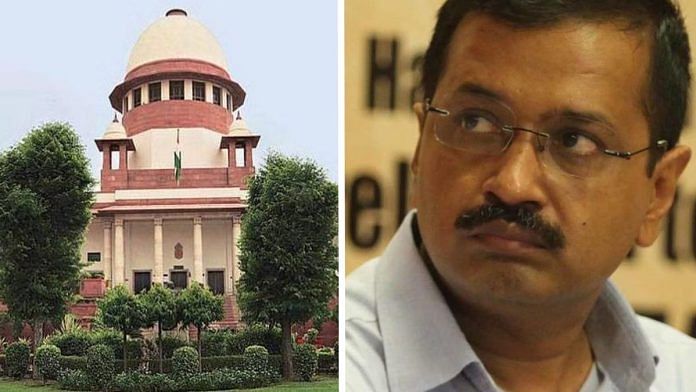New Delhi: The Supreme Court Tuesday asked the Enforcement Directorate (ED) to explain why Delhi Chief Minister Arvind Kejriwal’s arrest came just before the 2024 Lok Sabha (LS) elections.
Kejriwal was arrested on 21 March this year in a case registered by the ED over alleged irregularities in the 2021-22 Delhi excise policy, withdrawn by the Delhi government later. The court was hearing Kejriwal’s appeal challenging his arrest and remand.
A bench of justices Sanjiv Khanna and Dipankar Datta posed five questions to the ED, including one about the timing of his arrest. “Liberty is exceedingly important. We can’t deny that. Last question is with regard to the timing of the arrest… before the general elections,” Justice Khanna said.
The principal argument made in Kejriwal’s appeal is that his arrest so close to the Lok Sabha elections was to prevent him from campaigning for the Aam Aadmi Party (AAP) in the Lok Sabha polls.
The ED has alleged in its case that the AAP utilised the funds from the excise policy “scam” in the Goa elections, but the party has denied it.
Apart from asking the ED to explain why Kejriwal’s arrest came before the elections, the court also enquired about the time gap between the initiation of proceedings and the action resulting in his arrest.
The bench then asked the ED to clarify how it initiated criminal proceedings against Kejriwal without adjudicatory proceedings, which entails the attachment of the unlawfully gained movable or immovable property.
“There are no proceedings of attachment in this case so far, and if there are, then show how the petitioner (Kejriwal) is involved,” the bench said.
It also noted a distinction between Kejriwal’s petition and his former colleague Manish Sisodia’s bail plea, which the same bench dismissed in October 2023. “As far as the Manish Sisodia case is concerned, there are findings in favour and against. Tell us where does the Kejriwal case lie then,” the judges asked Additional Solicitor General S.V. Raju, who appeared for the ED.
The court also asked the agency to respond to Kejriwal’s arguments that the threshold of Section 19 of the 2002 Prevention of Money Laundering Act (PMLA) — which gives ED officers wide powers to arrest if there is “reason to believe” that there is an offence committed — is very high.
According to Kejriwal’s contention, the onus on the prosecution to justify the arrest of the person suspected to be involved in the act of money laundering is very high because the onus shifts to the accused when they seek regular bail under the PMLA.
Under Section 45 of PMLA, a regular bail grant is only when the court is satisfied that prima facie, there is no case against the accused, and the onus lies on the accused to prove this before the court.
“How do we interpret it (argument). Do we make the threshold much higher (for arrest) and ensure that standard (as followed while considering grant of bail) is the same to find the person who is guilty?” the judges wondered.
Tuesday was the second day of hearing in the matter. The court will now take up the case Friday.
Gap between Vijay Nair’s arrest and Kejriwal’s
Kejriwal’s lawyer and senior advocate Abhishek Manu Singhvi argued on the case’s merits and said there was no proof of Kejriwal’s direct interest in the alleged scam. There was no trace of any proceeds of crime either.
Singhvi took the court through the circumstances under which Kejriwal was arrested and also the recorded statements of witnesses in the case.
Singhvi referred to former YSR Congress Party leader (now with the Telugu Desam Party) Magunta Srinivasulu Reddy, based on whose statement Kejriwal faced arrest. Reddy’s initial statement to the ED was that he met the CM to discuss charity, not in the context of the liquor policy.
Five months later, Reddy recorded a new statement that implicated Kejriwal, said Singhvi, adding that this U-turn was because Reddy’s son Raghava was under arrest. Reddy made a statement against the CM to secure his son’s bail, Singhvi said, urging the court to read between the lines.
Singhvi also pointed out that former AAP communications in-charge Vijay Nair, who allegedly received kickbacks, was arrested in November 2022, and wondered why Kejriwal’s arrest came in March 2024. He added that there was no explanation behind not arresting Kejriwal only at that time.
As the hearing concluded Tuesday, Justice Khanna observed that he had initially thought of not hearing Kejriwal’s petition as he had decided on the Manish Sisodia bail application. “But then it would be said that I am not taking difficult cases or something…” the judge added.
(Edited by Madhurita Goswami)
Also read: Delhi Court extends judicial custody of Kejriwal, BRS leader Kavitha till 7 May in ED case



